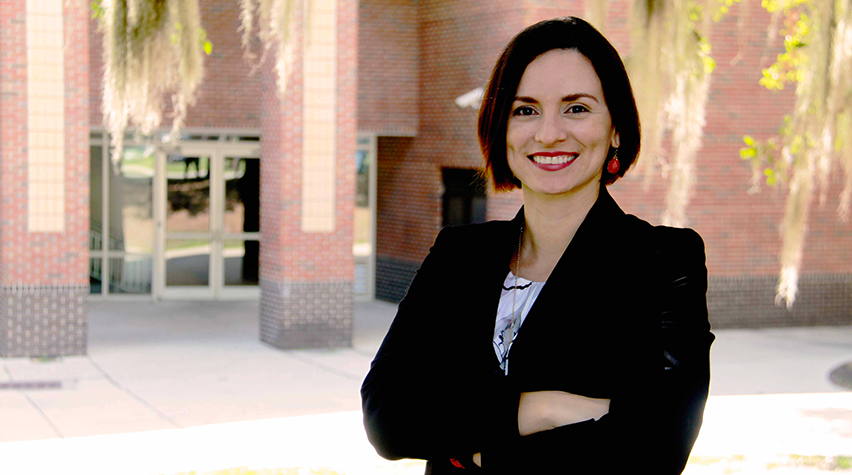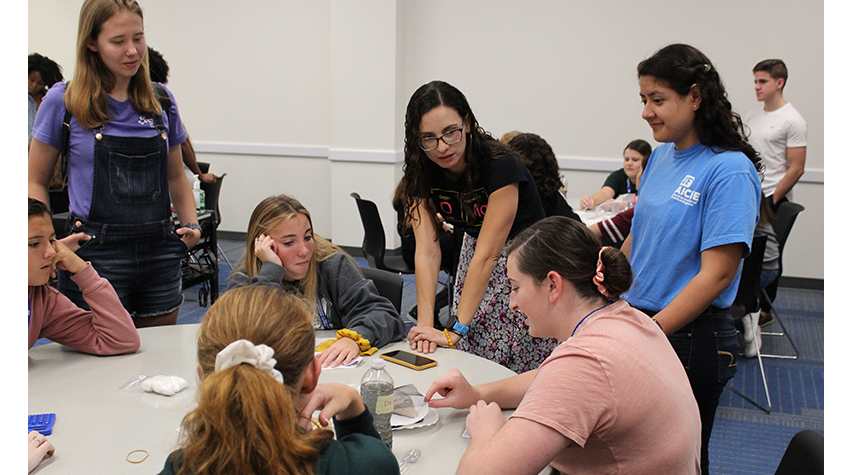
Story written by Maria Carmona-Montalvo and Michael Böhm
Sindia Rivera-Jimenez earned her PhD in chemical engineering at the University of Puerto Rico, Mayagüez, where she minored in environmental engineering and developed an interest in philosophy. Today, she is affiliate chemical engineering faculty and a lecturer in the Department of Engineering Education at the University of Florida — where she is also the AIChE Student Chapter Advisor.
But that brief description doesn’t really do Sindia justice. To teach science — in a classroom or a science museum or a community center — is to pass along a concept’s intrinsic value and its practical applications. Achieving these outcomes requires thinking deeply, distilling the critical components, then devising a simple yet meaningful way to express the material. To get her message through to students—both those in her classroom and K–12 students—Sindia draws on her knowledge of science and as well as her own experiences as a student.
Early career
Early in her career, Sindia gained experience working in industry, but she quickly found that working in a plant was limiting for her, and that academia offered more of what she really loved — teaching and helping students grow professionally. And that reveals Rivera-Jimenez’s true credentials: through her experiences she has come to deftly fuse the characteristics of a contemplative philosopher and a pragmatic engineer.
Dr. Rivera-Jimenez is the type of professor that college students hope for. She is highly involved at the beginning of any project. Once she is assured that her students understand the basics, she gives them the freedom to explore and bring the project to fruition. This means that the students at the University of Florida have a fierce advocate in Sindia.
Paying it forward
Remembering how instrumental one particular professor was in her own academic progress, she pays it forward by finding those academically talented students who need a little inspiration or a way to pay for school. She then tries to match them with the resources available off and on campus. Her assistance does not stop there. Rivera-Jimenez encourages her students to volunteer in the local community. By doing so, the University of Florida AIChE Chapter offers young students of color a path into STEM.
STEM outreach
Every day, Rivera-Jimenez looks for ways to help her student chapter members excel. Immediately after each year’s AIChE Annual Student Conference, she meets with her students to discuss the next year’s potential K–12 STEM Outreach Competition project. The chapter members pitch their ideas, and, eventually, a project is selected. The team then works to develop a thorough STEM teaching module that is imaginative, relevant, and, above all, fun to do. At the 2020 STEM Competition, the team won the 9th to 12th grade category with their teaching module “Saving Lives with Centrifugation.”
Many of the winning modules from the AIChE K–12 STEM Outreach Competition are available in an archive, available to members of AIChE’s K–12 Community.

Rivera-Jimenez (center) consults with her AIChE Student Chapter members as they design a filtration system demonstration for AIChE’s 2019 STEM Showcase.
Rivera-Jimenez credits her life in STEM to the magnet-type high school she attended — which provided her first exposure to STEM and opened her mind to possibilities. That experience also gave her access to advocates of her own. She recalls that, while she excelled in physics and chemistry, she gave herself too little credit in mathematics. Seeing that, her academic advisor suggested that Sindia go into engineering.
Perseverance
Still, she says that she struggled when she started her undergraduate studies at the University of Puerto at Mayagüez, as she tried to balance family life, multiple jobs to pay for school, and carrying the rigorous course load of an engineering student. But she explains she learned the crucial lesson of perseverance at a time when the pressures of being a student caused her to consider dropping out of chemical engineering. The lesson came from a professor who encouraged her to continue her studies by sharing his own past struggles. He showed her one of his own report cards that had a zero as the grade point average for one semester, and explained that even though he failed that semester, he was not a failure.
Finding her passion
With that professor’s encouragement and recommendation, Sindia replaced her old jobs with a new job conducting K–12 outreach activities in schools near the university. In the outreach program, Sindia and other university students created STEM kits and took them to all the region’s K–12 schools, regardless of how remote they were. The team would test the demos to make sure that the kits would be useful for the schools and that the students would get the most out of them. They would then teach the teachers how to deliver the modules to the students.
That was how Sindia discovered her passion for teaching, and how she learned the importance of continual engagement between students and teachers — something that she practices to this day.
Just as she did in that pivotal first K–12 outreach job, Sindia continues to carve out time to do outreach as a thank-you for a twenty-year-long career. She also says that AIChE has helped her throughout her career. So, in turn, she strives to provide her own students with what they need to succeed.

